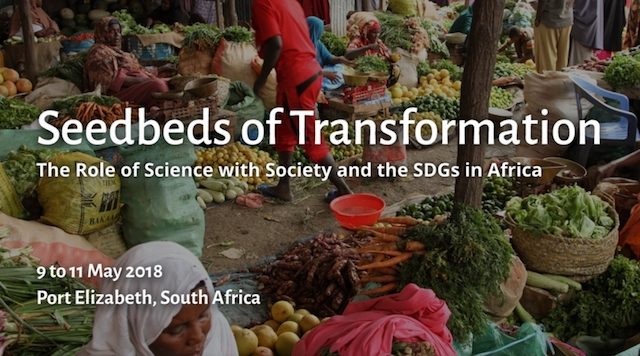Deadline: February 16, 2018
Future Earth invite researchers, innovators and change-makers to propose SDG Labs Africa for the Seedbeds conference. SDG Labs are intended to bring together participants from a range of research disciplines and sectors of society to develop solutions to complex problems that help to make progress towards implementation of the UN Sustainable Development Goals (SDGs). The SDG Labs concept aims to initiate processes towards sustainability transformations through developing prototype solutions.
SDG Labs Africa – solutions for change
The Seedbeds conference has a specific focus on Africa. The Labs can take place anywhere in Africa, or anywhere in the world if a majority of the participants are from Africa and the focus is highly relevant for sustainability in Africa.
They will allocate up to 7,000 EUR to each SDG Lab, which will consist of 5,000 to 6,000 EUR for lab activities, and 1,000 to 2,000 EUR for travel support to attend the conference, present your results and receive feedback.
They have three focus areas for the labs:
- Sustainable oceans and coasts. Addressing any of the targets of SDG 14 on Oceans.
- Urban sustainability. Addressing any of the targets of SDG 11 on Cities, or related goals, such as energy access, biodiversity, and climate adaptation in urban areas.
- Digital technology for transformation. Addressing rapid spread and improvement of technology as catalysts or drivers of social and environmental change eg: artificial intelligence, machine learning, data visualisation, ICT, mobile apps.
Addressing one or more of these focus areas will increase the chance that your Lab proposal will be funded. It is also recommended that your lab proposal demonstrates how it will address one or more of the overall conference themes.
How it works
In practice, a lab is a short series of solutions-focused workshops aimed at delivering a specific innovation. This is how a Lab works: You put together a team of people with different backgrounds, and ideas for how to find solutions to a very specific sustainability challenge. The “idea” in this case could be, for instance, a certain process, activity, bringing together of specific stakeholder groups, a technical solution, design activity, etc.
The solutions should be evidence-based, have legitimacy within the stakeholder groups you are engaging, and include some element(s) of innovation, include local or indigenous knowledge as relevant, and provide culturally appropriate meeting formats. You design a process to explore the idea on the relevant scale and you try it out. That is the lab.
The SDG Labs-Africa process would be expected to follow four phases:
- Initiate: Start pre-conference activities through research and preparation. Activities in this phase would be expected to involve outreach to understand the Lab’s specific conditions and opportunities, such as gathering stories, sketching or having preparatory meetings. This phase should be more than just a literature review.
- Feedback: At the Seedbeds conference, present what you have done and receive feedback on your plan to complete the lab from conference participants.
- Convene: Develop one or more workshops , to be completed within 4 months after the Seedbeds conference. This is the phase where most of the practical work of the Lab takes place.
- Show. Share lab results and lab media (photos, videos etc) on a dedicated website convened by Future Earth to amplify the lab’s impact and support its spread.
Funding will be provided up-front for the lab, and financial reporting of expenditures will be required at the completion of the lab.
In short:
- Up to 20 SDG Labs will be funded
- Each lab will receive up to €7000 to run a lab/workshop/hack and present their initial findings at the Seedbeds conference
- The 3 themes for SDG Labs are: oceans and coasts, urban sustainability, and digital technology for transformation
Eligibility
- Open to researchers, innovators and change-makers from across Africa
- Proposals must be led by African institutions
A successful proposal will contain the following elements:
- A clear and original idea on how to tangibly address a sustainability issue; and that both the issue and the potential solution have strong local relevance.
- A clear plan for how to operationalize your idea in a Lab form.
- The Lab connects well with one or more focus areas of this call.
- The team has diverse knowledge and skills relevant to the Lab.
- The Lab engages diverse groups, comprised of some combination of the following: researchers, innovators, policymakers, and other key local actors.
- The Lab examines elements of both environmental and social sustainability.
- The lab focuses on African concerns, particularly in Least Developed and Low Income Countries (OECD DAC list).
Application
Submit your application here.
For more information, visit Seedbeds Transformation Conference.

